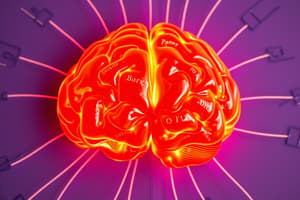Podcast
Questions and Answers
What are two effective strategies for increasing the meaningfulness of movements required to perform a skill?
What are two effective strategies for increasing the meaningfulness of movements required to perform a skill?
- Visual imagery and verbal labels (correct)
- Mental distractions and physical fatigue
- Auditory cues and tactile sensations
- Repetition and speed
Why are movements higher in meaningfulness remembered better?
Why are movements higher in meaningfulness remembered better?
- They are faster and more efficient
- They are more easily related to spatial and temporal characteristics (correct)
- They are more abstract
- They require less coordination
What characteristic of a new skill makes it likely to be more abstract than concrete?
What characteristic of a new skill makes it likely to be more abstract than concrete?
- Inherent meaningfulness
- Repetition of the skill
- Familiarity with the skill
- Requiring coordination of body and limbs in a new way (correct)
What do strategies that enhance memory performance aim to facilitate?
What do strategies that enhance memory performance aim to facilitate?
What is the Encoding Specificity Principle based on?
What is the Encoding Specificity Principle based on?
What does the Encoding Specificity Principle state about the relationship between test and practice contexts?
What does the Encoding Specificity Principle state about the relationship between test and practice contexts?
What type of skills does the Encoding Specificity Principle seem especially relevant to?
What type of skills does the Encoding Specificity Principle seem especially relevant to?
What is an example of a closed skill mentioned in the text?
What is an example of a closed skill mentioned in the text?
What is essential according to the Encoding Specificity Principle for successful performance during the test of closed skills?
What is essential according to the Encoding Specificity Principle for successful performance during the test of closed skills?
What does the Encoding Specificity Principle suggest about practice conditions for closed skills?
What does the Encoding Specificity Principle suggest about practice conditions for closed skills?
What is the practical implication of the Encoding Specificity Principle for learning closed skills?
What is the practical implication of the Encoding Specificity Principle for learning closed skills?
According to the Encoding Specificity Principle, what is essential for game performance in shooting free throws?
According to the Encoding Specificity Principle, what is essential for game performance in shooting free throws?
What kind of practice conditions should be emphasized based on the Encoding Specificity Principle for a knee joint replacement patient working on knee joint flexion and extension?
What kind of practice conditions should be emphasized based on the Encoding Specificity Principle for a knee joint replacement patient working on knee joint flexion and extension?
What does the Encoding Specificity Principle suggest about the relationship between test conditions and practice conditions?
What does the Encoding Specificity Principle suggest about the relationship between test conditions and practice conditions?
What kind of learning and performance does the Encoding Specificity Principle apply to?
What kind of learning and performance does the Encoding Specificity Principle apply to?
What is the influence of differences in conditions during the time of movement practice and recall on recall performance, according to the text?
What is the influence of differences in conditions during the time of movement practice and recall on recall performance, according to the text?
What is another term for subjective organization in motor skill learning?
What is another term for subjective organization in motor skill learning?
Which strategy is commonly used to memorize long monologues, lists of terms, music pieces, or dance routines?
Which strategy is commonly used to memorize long monologues, lists of terms, music pieces, or dance routines?
What happens to the size of the chunks with continued practice?
What happens to the size of the chunks with continued practice?
What benefit does subjective organization provide for recall performance?
What benefit does subjective organization provide for recall performance?
What has been shown to be spontaneously created by some individuals in relation to subjective organization?
What has been shown to be spontaneously created by some individuals in relation to subjective organization?
What are memory performance deficits after a stroke linked to?
What are memory performance deficits after a stroke linked to?
Who has difficulties implementing subjective organization strategies without external guidance?
Who has difficulties implementing subjective organization strategies without external guidance?
How do experts approach the learning of complex skills compared to novices?
How do experts approach the learning of complex skills compared to novices?
What do skilled performers use subjective organization to reduce and increase, respectively?
What do skilled performers use subjective organization to reduce and increase, respectively?
Who more accurately remember structured plays compared to unstructured plays, with guards showing higher recognition accuracy due to their experience in determining and implementing plays?
Who more accurately remember structured plays compared to unstructured plays, with guards showing higher recognition accuracy due to their experience in determining and implementing plays?
What is an important influence on the retention of motor skills?
What is an important influence on the retention of motor skills?
What plays a significant role in the retention and recall of motor skills?
What plays a significant role in the retention and recall of motor skills?
What is visual metaphoric imagery as a memory strategy?
What is visual metaphoric imagery as a memory strategy?
How does attaching meaningful verbal labels to movements affect retention performance?
How does attaching meaningful verbal labels to movements affect retention performance?
What is the impact of intentional memory situations on remembering?
What is the impact of intentional memory situations on remembering?
How does advance knowledge about a test affect memory performance and skill learning?
How does advance knowledge about a test affect memory performance and skill learning?
What is subjective organization as a memory strategy?
What is subjective organization as a memory strategy?
How does metaphoric imagery aid the learning of complex motor skills?
How does metaphoric imagery aid the learning of complex motor skills?
What is the impact of attaching useful verbal labels to positioning movements on retention performance?
What is the impact of attaching useful verbal labels to positioning movements on retention performance?
How does advance notice of a future skill test impact student effort during practice?
How does advance notice of a future skill test impact student effort during practice?
What does research indicate about encoding and storing information?
What does research indicate about encoding and storing information?
What is the impact of incidental memory situations on retention test performance?
What is the impact of incidental memory situations on retention test performance?
What did the research by Nordin and Cumming show about metaphoric imagery and dance skills?
What did the research by Nordin and Cumming show about metaphoric imagery and dance skills?
How do visual metaphoric imagery and verbal labels aid the learning of motor skills?
How do visual metaphoric imagery and verbal labels aid the learning of motor skills?
Study Notes
Memory Strategies in Motor Skill Learning
- Visual metaphoric imagery as a memory strategy involves creating a mental picture of a movement.
- Instructors should use metaphors familiar to learners, such as imagining picking an apple to learn swimming movements.
- Research by Nordin and Cumming showed the beneficial use of metaphoric imagery by dancers for complex dance skills.
- Attaching meaningful verbal labels to movements has been shown to improve retention performance, as demonstrated by John Shea's study.
- Useful verbal labels attached to positioning movements can make young children's retention performance equivalent to that of adults.
- Visual metaphoric imagery and verbal labels aid the learning of complex motor skills by reducing complexity and changing abstract movements to concrete, meaningful ones.
- They also direct attention to the outcome of the movements, enhancing skill performance, and speed up the movement planning process.
- Intentional memory situations, where participants know they will be tested later, lead to better remembering than incidental memory situations.
- However, retention test performance in the incidental situation is typically better than if no previous experience with the test movements had occurred.
- Research indicates that we encode and store more information than we are consciously aware of, and advance knowledge about a test can enhance memory performance and skill learning.
- Memory performance and skill learning can be enhanced by telling students in advance that they will be tested on a skill later, leading to increased effort during practice.
- Subjective organization, involving grouping or organizing information in a meaningful way, is a frequently used memory strategy by learners for large amounts of information.
Studying That Suits You
Use AI to generate personalized quizzes and flashcards to suit your learning preferences.
Description
Test your knowledge about memory strategies in motor skill learning with this quiz. Explore the use of visual metaphoric imagery, verbal labels, intentional memory situations, and subjective organization in enhancing memory performance and skill learning. Discover how these strategies can aid in the retention and performance of complex motor skills.




